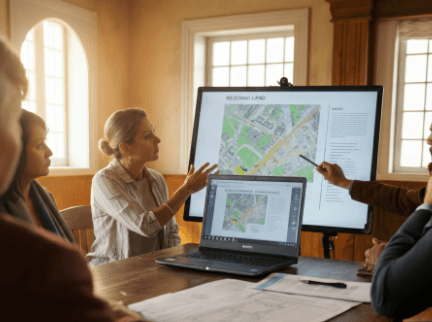Navigating the complexities of urban growth and community development requires a thorough understanding of land use planning and future developments. This blog aims to demystify the processes and strategies shaping our living environments. From zoning regulations to sustainable design principles, we’ll explore how land use planning and future developments are pivotal in creating spaces that meet the diverse needs of residents while anticipating future demands. Whether you’re a resident, business owner, or urban planning enthusiast, this guide will provide valuable insights into the transformative potential of thoughtful land use planning and future developments in our area.
Prominent real estate investors like Steve Daria and Joleigh play a crucial role in shaping future developments in our community. Their investments drive vital projects that bring innovative designs and sustainable practices to the forefront. By aligning their strategies with zoning regulations and community needs, they help create vibrant, well-planned spaces that benefit all residents.
Understanding Land Use Planning
Before navigating land use planning and future developments in the area, it’s essential to understand that land use planning is the process of evaluating and designating land use in both urban and rural areas.
It involves creating plans that balance various factors, such as environmental sustainability, economic growth, and community needs.
A well-thought-out land use plan can guide development, making sure that resources are used efficiently and responsibly.

Critical Components of Land Use Planning
There are vital components of land use planning. Here it is:
- Land Zoning and Regulations: Zoning laws dictate how land can be used, whether for residential, commercial, industrial, or agricultural purposes. Understanding land zoning and regulations is essential for any development project.
- Environmental Considerations: Sustainable development practices are becoming increasingly important. Incorporating green spaces, managing waste, and protecting natural resources are vital to modern land use planning.
- Community Input: Engaging with local communities and stakeholders ensures that development projects meet the needs and expectations of those most affected.
Benefits of Effective Land Use Planning
Effective land use planning offers several benefits, including:
- Enhanced Property Values: Properly planned developments can increase property values by creating desirable living and business environments.
- Reduced Environmental Impact: Sustainable planning practices help minimize the ecological footprint of development projects.
- Improved Quality of Life: Thoughtful planning can improve infrastructure, recreational areas, and community well-being.
Get Started: Get Your Cash Offer Below…
We are direct land buyers. There are no commissions or fees and no obligation whatsoever. Start below by sharing where your property is and where we can send your offer…
Future Developments and Trends
Staying informed about future developments is crucial for anyone involved in land development.
Anticipating trends can help you make strategic decisions and capitalize on emerging opportunities.
Technological Advancements in Real Estate
Technology has a significant part in shaping the future of real estate development.
Innovations such as smart cities, augmented reality, and blockchain are transforming how properties are developed, marketed, and sold.
Urbanization and Population Growth
Swift urbanization and population growth drive demand for new housing, commercial spaces, and infrastructure.
Understanding these trends can help you identify high-demand areas and make timely investments.
Sustainability and Green Building
Sustainability is no longer just a buzzword but a fundamental aspect of modern development.
Green building practices, energy-efficient designs, and renewable energy sources are becoming standard in new developments.
Strategies for Successful Land Development
Successful land development requires careful planning, research, and execution.
Here are some strategies to help you achieve your development goals.
Conduct Thorough Market Research
Conduct comprehensive market research before going on a development project to know the local demand, competition, and economic conditions.
This information will guide your decisions and help you identify profitable opportunities.
Collaborate with Experts
Working with experienced professionals, such as urban planners, architects, and environmental consultants, can ensure your project meets regulatory requirements and achieves its full potential.
Secure Financing and Investment
Securing adequate funding is essential for any development project.
Involving in various financing options, including loans, grants, and partnerships, to make sure you have the necessary resources to bring your vision to life.
Tips for Navigating Zoning Regulations
Zoning regulations can be complex, but understanding them is crucial for successful development.
Familiarize Yourself with Local Zoning Codes
Different regions have different zoning laws, so it’s important to familiarize yourself with the specific regulations in your area.
This information will help you dodge legal issues and ensure your project complies with local requirements.
Seek Professional Guidance
Consulting with zoning experts, such as attorneys and urban planners, can provide valuable insights and help you navigate the complexities of zoning regulations.

Stay Informed About Changes
Zoning laws can change, so staying informed about any updates or amendments affecting your project is essential.
Regularly checking local government websites and attending community meetings can help you stay informed.
Addressing Common Challenges
Land development has its fair share of challenges.
Here are the common obstacles and strategies for overcoming them.
Environmental Concerns
Environmental regulations and concerns can impact development projects.
To address these challenges, conduct thorough environmental assessments, implement sustainable practices, and engage with environmental experts.
Community Opposition
Community opposition can arise when development projects disrupt local neighborhoods or ecosystems.
Engaging with the community early in planning, addressing concerns, and incorporating feedback can help mitigate opposition and build support.
Financial Constraints
Financial constraints can hinder the progress of development projects.
To secure the necessary funding, consider exploring alternative financing options, such as public-private partnerships and grants.
Frequently Asked Questions
Explore the most common queries about land use planning and future developments.
What is the importance of land use planning?
Land use planning is essential for creating balanced and sustainable communities.
It ensures that resources are used efficiently, development projects align with community needs and minimizes environmental impacts.
How can I stay updated about future developments in my area?
Staying informed about future developments requires regular research and engagement with local government agencies, community organizations, and industry publications.
Attend community meetings, subscribe to newsletters and network with professionals in the field.
What are the benefits of sustainable development practices?
Sustainable development practices are crucial in mitigating environmental impacts by promoting resource efficiency and reducing carbon footprints.
Integrating renewable energy sources and utilizing green building materials reduce energy consumption and emissions.
Conclusion
In the rapidly evolving world of real estate, understanding land use planning and future developments is essential for success. By staying informed about trends, conducting thorough research, and implementing effective strategies, land developers, real estate investors, land buyers, sellers, and property owners can make better decisions that lead to profitable and sustainable outcomes.
**NOTICE: Please note that the content presented in this post is intended solely for informational and educational purposes. It should not be construed as legal or financial advice or relied upon as a replacement for consultation with a qualified attorney or CPA. For specific guidance on legal or financial matters, readers are encouraged to seek professional assistance from an attorney, CPA, or other appropriate professional regarding the subject matter.
